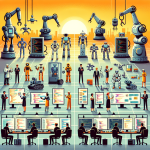In an age where technology evolves rapidly, the need for skilled professionals who can adapt to changes and streamline processes is paramount. Among the various roles emerging in the tech landscape, automation engineers stand out as pivotal players. With the rise of automation technologies, these professionals are at the forefront of transforming industries, driving efficiency, and ultimately future-proofing their careers.
Understanding Automation Engineering
Automation engineering involves designing, programming, and maintaining systems that perform tasks automatically. This field encompasses a wide range of technologies, including robotics, machine learning, and artificial intelligence. Automation engineers are responsible for creating systems that minimize human intervention while maximizing productivity, reliability, and safety.
Key Responsibilities
The responsibilities of automation engineers can vary significantly based on the industry and specific role. Generally, they are involved in:
- System Design: Developing automated systems tailored to meet specific operational needs.
- Programming: Writing code to control machinery and processes, using languages such as Python, Java, and specialized automation languages.
- Testing and Debugging: Ensuring that automated systems function as intended and troubleshooting any issues that arise.
- Maintenance and Upgrades: Regularly updating systems to enhance their capabilities and ensure they remain relevant as technology evolves.
- Collaboration: Working alongside other engineers, stakeholders, and management to ensure seamless integration of automation technologies.
The Demand for Automation Engineers
The increasing reliance on automation across various sectors such as manufacturing, logistics, healthcare, and finance signifies a growing demand for automation engineers. As organizations strive to reduce operational costs, improve efficiency, and enhance product quality, automation becomes a key strategy. According to recent surveys, the demand for skilled automation engineers is expected to continue rising, making this an excellent career choice for the future.
Industries Embracing Automation
-
Manufacturing: Automation engineers design robotic systems that can perform repetitive tasks, which boosts productivity and minimizes human error.
-
Healthcare: From robotic surgical systems to automated patient management systems, automation is revolutionizing healthcare processes.
-
Finance: Automation assists in tasks such as data analysis, compliance checks, and risk management, significantly improving efficiency in this critical sector.
- Transportation and Logistics: Automated systems help streamline supply chains, manage inventory, and optimize delivery routes, enhancing efficiency and reliability.
Skills Necessary for Automation Engineers
To thrive in this field, aspiring automation engineers should focus on acquiring a blend of technical and soft skills:
-
Technical Proficiency: A solid foundation in programming, system design, and a keen understanding of hardware and software integration.
-
Problem Solving: The ability to troubleshoot complex systems and develop innovative solutions is vital.
-
Analytical Skills: Understanding data trends and leveraging insights for improved automation processes.
-
Communication: Effective collaboration with multidisciplinary teams is essential for successful project outcomes.
- Adaptability: Staying current with rapidly evolving technologies and methodologies is crucial in the tech industry.
Future Trends in Automation Engineering
As technology advances, several trends are likely to shape the future of automation engineering:
-
Artificial Intelligence: Integration of AI into automation systems will enhance decision-making capabilities and lead to smarter, more responsive systems.
-
Cloud Computing: Cloud-based automation solutions provide scalability and flexibility, allowing organizations to adapt more quickly to market changes.
-
Internet of Things (IoT): Automation engineers will increasingly work with IoT devices to create interconnected systems that yield real-time data and insights.
- Cybersecurity: As automation systems become more prevalent, ensuring their security will be a top priority, creating new opportunities for engineers specializing in this area.
Conclusion
The role of automation engineers is becoming increasingly vital in today’s tech-driven world. As industries continue to embrace automation to improve efficiency and reduce costs, the demand for qualified professionals in this field will only grow. By acquiring the right skills and staying abreast of emerging trends, you can not only secure a rewarding career in automation engineering but also ensure it remains resilient against the evolving demands of the future.
In essence, embracing a career in automation engineering today can be your key to future-proofing your professional path, offering diverse opportunities across various industries, and playing a significant role in shaping the technological landscape of tomorrow.




